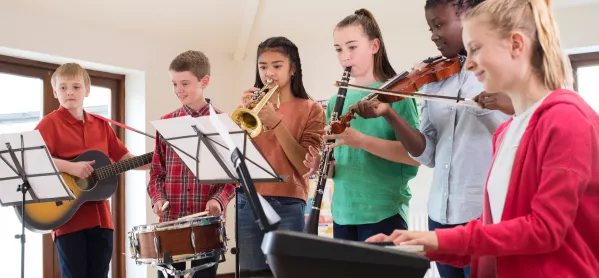Music lessons should offer more scope for creativity, with a greater focus on composition, according to a majority of educators.
New research by Sound and Music, the UK’s national charity for music, shows that 97 per cent of those working across the music education sector agree composing should be a core element of every child’s learning.
And the same proportion believe there should be more opportunities for young people to create and compose their own music.
News: ‘Thousands’ of peripatetic music teacher jobs ‘at risk’
Policy: ‘We are driving out creative teachers,’ says Pisa boss
From the magazine: Hit the decks to engage music students
The charity surveyed 550 educators from across the UK including heads, teachers and musicians working in schools.
It found that teachers felt barriers to young people learning to compose their own music included: limited access to resources (29 per cent cited this); composing being undervalued (22 per cent); and pupils lacking confidence in composing (21 per cent).
Confidence was a key issue for older children. The survey found that teachers felt 63 per cent of pupils in key stage 2 were just as confident, or more confident, at composing music as performing it, whereas just 36 per cent of KS3 pupils and 33 per cent of those in KS4 feeling confident about creating their own music.
“Unlike playing an instrument or singing, where there are well-established, well-understood pathways and qualifications for young people, most of which have been in place for many years, there are no consistent progression routes for young composers,” the report says.
“Teaching composing and creative music-making is the area of the music curriculum where we know that teachers feel the least confident, yet training and support for educators is thin on the ground, and what activity there is tends to be fragmented, with educators having very limited knowledge of other opportunities because of limited signposting.”
The charity made 21 recommendations, including that the needs of young composers should be recognised by the next national plan for music education, the national curriculum and the forthcoming model music curriculum.
It added: “For schools where the national curriculum does not apply, the role of composing as an integral part of music education should be recognised through other means including Ofsted inspection criteria.”
The report also recommended that Ofqual and exam boards should develop improved criteria to assess creative composing skills.
Susanna Eastburn, chief executive of Sound and Music, said: “This matters because now, more than ever, the creative, problem-solving and collaborative capabilities that composing uniquely requires and develops are vital for the future - both in terms of ensuring that we have a new generation of talented composers contributing to the future of our culture, but also because these skills are precisely those which our young people will need in order to thrive in and navigate an increasingly complex, changing and automated world.”
A spokesperson for the Department for Education said: “We want all pupils to have the opportunity to study music at school - that’s why it is compulsory in the national curriculum from the age of 5 up to 14. We also want all pupils to have the opportunity to compose and create their own music, and this is a key aim of the music national curriculum.
“Through our music hubs programme, more than 700,000 children learned to play instruments in class together in 2016-17 and we are putting more money into arts education programmes than any subject other than PE - nearly half a billion pounds to fund a range of music and cultural programmes between 2016 and 2020. This money is in addition to the funding that schools receive to deliver their curriculum.
“We are currently working with music groups and practitioners to refresh the national plan for music education and develop a high-quality model music curriculum.”





